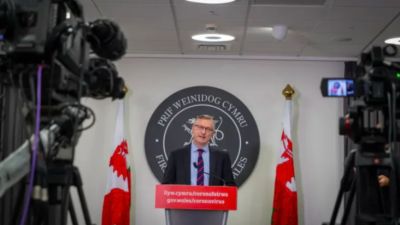NHS chief executive hails progress in falling Covid numbers but warns situation remains 'precarious'

The incidence rate of coronavirus in Wales has fallen to around 110 cases per 100,000 people but "the situation in the NHS remains precarious", the chief executive of NHS Wales has said.
Dr Andrew Goodall told a press conference in Cardiff that the NHS has been "intense and sustained pressure over the last few months" but lower levels of community transmission are beginning to "translate into lower levels of admissions to our hospitals."
"There are now around 2,200 Covid-related patients in Welsh hospitals.
Dr Goodall also told the press conference sickness and absence levels amongst NHS staff remain high.
Around 8% of NHS staff were currently absent from work, a rise of 3% compared to the same period last year.
Half of current NHS staff absences were due to coronavirus, Dr Goodall added.
"NHS staff have worked under exceptional pressure, providing healthcare and support in the most extraordinary circumstances, without a break" he said.
"The last few months have been some of the most difficult periods they have ever experienced.
"Our sickness and absence rates remain high – at this point last year around 5% of our staff were absent; currently this is 8% (and has been higher). Around half of this relates to coronavirus."
There are still nearly 50% more patients with coronavirus in hospital beds compared to the April peak last year, Dr Goodall added, with NHS staff supporting the equivalent of 116% occupancy in critical care units.
There were a further 21 suspected coronavirus deaths and 323 confirmed cases, Public Health Wales data published on Wednesday revealed.
On vaccinations, 655,419 people have received their first dose of the coronavirus vaccine; 3,687 have been given a two-dose course.
Amongst the over-80s, the Joint Committee on Vaccination and Immunisation's (JCVI) top priority group, 86.8% had received a vaccine.
Concerns remain over the spread of coronavirus in north Wales, where in some areas infection levels remain above 200 per 100,000 people.
Dr Goodall said there was evidence the new Kent variant of the virus, one of a few mutations to Covid-19, had been contributing to higher transmission levels in the community.
He said: "What we do have in north Wales is evidence that the Kent variant that we've been tracking over these recent weeks is much more prevalent up there and given the transmissibility of that, that would have influenced some of the community rates up there at this stage.
"Whilst the pattern this time means that the virus is more prevalent generally across Wales there does still seem to be a bit of a lag around north Wales receiving cases or identifying cases later than the rest of Wales.
"I think we're still seeing that work its way through but having said that, I've been pleased to see over the last couple of weeks just some stabilisation of those numbers in north Wales."
Discussing the issue of new variants more broadly, Dr Goodall said there could be "difficulties ahead" and that the potential for future coronavirus mutations was another cause for concern.
"The modelling does show us there could still be some difficulties ahead for us" he said.
"We would hope that there would be some advantages from going into the summer months because we know it's a virus that doesn't like the warmth.
"We saw that through last summer when, on the back of removing some of the restrictions, we were able to retain a lower level of prevalence at this stage but the new variants do cause me concern.
"Even modelling that I'm needing to look at to oversee the NHS show that there could still be some [difficult] moments, even over the coming months and despite vaccinations, which is why we do need to ask the public to keep working with us and complying."
Read more: